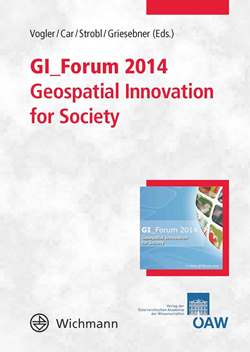 |
 |
Robert Vogler – Adrijana Car – Josef Strobl – Gerald Griesebner (Eds.)
GI_Forum 2014, Volume 2
Geospatial Innovation for Society – Conference Proceedings
Babatunde Osunmadewa,
Christine Wessollek
S. 91 - 100 doi: 10.1553/giscience2014s91
Verlag der Österreichischen Akademie der Wissenschaften
Abstract:
Natural vegetation is an important source of livelihood for rural communities living in the savannah region of Nigeria. Apart from the direct benefit derived from vegetation exploration, vegetation also is of vital importance in environmental processes such as protecting soil against erosion and maintaining the carbon cycle. Due to human perturbation and inherent climate variability, there has been an increasing decline in vegetation productivity over the last decades in the guinea savannah region of Nigeria. Hence, there is an urgent need to carry out research on seasonal trends of vegetation pattern using reliable techniques, especially in Nigeria where population is growing at a fast rate, and the dependency on vegetation for means of livelihood is high. This paper analyses the trends in vegetation greenness in Kogi state, Nigeria, using seasonal trend analysis (STA) to extract information from the monthly MODIS NDVI (Terra) data from 2000 to 2010 in four different locations. The results show considerable variations in the period of greening (start and end of greening) from the four different locations in Kogi state, a situation which implies that there is a shift in vegetation types in this ecological zone. This is taken to be a consequence of human interference due to the pattern of agricultural intensification and urban expansion over the years. Although, seasonal trend analysis is a robust means of analyzing trends in vegetation, this paper suggests that other indicators such as soil aridity, climatic data and land-use pattern should be included for further analysis in order to uncover human-induced loss of vegetation cover in the guinea savannah region of Nigeria.
2014/06/18 10:59:55 Object Identifier:
0xc1aa5576 0x0030d400
Rights:https://creativecommons.org/licenses/by-nd/4.0/
GIS as a technology has come a long way, from
the early adoption of technical wizardry to the
ubiquitous, if unconscious use by the masses. The
emergence of a GISociety is on its way through
technological development, theoretical and empirical
scientific research and inclusion of technology
into education with increasing pedagogical justification.
Defining new dimensions of hard- and software,
brainware and orgware are all needed to
further enhance the GISociety with new geospatial
innovations.
This issue of the Geoinformatics Forum (www.gi-forum.org)
links into these research areas. We are pleased to present
work by researchers who actively contribute to the
rising of geospatial innovations for society in theoretical,
empirical, technical, and educational terms.
This reflects that innovative alterations can only be
created though close interaction among the domains
of science, technology and education.
Topics of the 2014 issue therefore include:
• Innovations in geospatial technologies
• Advances in GIScience
• Monitoring global change
• Geoinformation for public health
• Education with digital earth
• Spatial Citizenship education
• Geospatial learning environments
The book is aimed at researchers and practioners
in the field of geoinformation with an academic,
industrial or educational background.
Work on this publication has been co-funded by the following projects and networks
funded by the European commission:
LLP-Comenius multilateral project SPACIT
(517908-LLP-2011-1-AT-COMENIUS-CMP)
|




 Home
Home Print
Print
 References
References
 Share
Share
